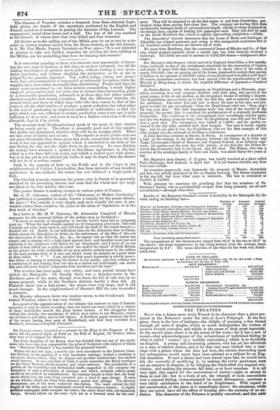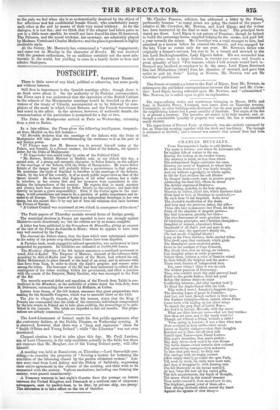THE THEATRES.
Never was a drama more truly Trench in its character than a piece pro- duced at the Princess's under the title of Love's Telegraph. In the first place, there is the love of intrigue—the delight of pursuing a fine thread through all sorts of tangles, which so much distinguishes the writers of modern French comedies, and which is the cause of their great ingenuity. In the second place, there is in the moral of the work—for it has a sort of moral—that acknowledgment of the subservience of individual feeling to what is called "reason," (1. e. worldly convention,) which is so decidedly un-English. A young and interesting princess, who has set her affections on a man of inferior station, and is by that very man tricked into a mar- riage with a prince whom she does not love, the curtain descending upon her unhappiness, would never have been selected as a subject for an Eng- lish dramatist. If such a theme had been forced upon him, he would have felt the necessity of modifying it, by making the lowly gentleman turn out an emperor in disguise, or by bringing the whole affair to a tragical con- clusion, and making the princess fall dead, or at least senseless. It is all very right this regard for the conventions of society—right to attend to them in real life; but in a work of art, the triumph of such conventions over a natural feeling, unaccompanied by moral delinquency, produces a very chilly satisfaction to the mind of an Englishman. With regard to the construction of the piece' it is exceedingly clover; the situations, while they are novel, have all the effect of keeping alive the curiosity of an au- dience. The character of the Princess is prettily conceived; and this adds to the pain we feel when she is so systematically deceived by the object of her affections and her confidential female friend; who comfortably marry each other at the end by means of their very moral trickery. As for the dialogue, it is but fiat; and we think that if the adapter had taken pains to put in a little more sparkle, he would not have found his time ill-bestowed The Princess and the moral trickster, her secretary, are admirably played by Madame Vestris and Charles Mathews; and the piece is produced in highly creditable style.
At the Surrey, Mr. Macready has commenced a " starring " engagement; and came out on Monday in the character of Hamlet. He was received with the greatest enthusiasm, by an audience certainly not the most aris- tocratic in the world, but yielding to none in a hearty desire to hear and admire Shakspere.



























 Previous page
Previous page